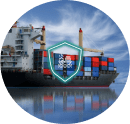Homepage » Export and Import Insurance
Export & Import
With globalization and good internet quality, companies have become involved in global trade. The majority of these imports and exports are done by ocean freight. Water bodies are still one of the primary mediums of trade. Imports and exports involve worldwide shipping, where minuscule damage can cause financial distress to several parties. In order to ensure that the parties involved don’t suffer significantly from cargo damage, it’s extremely important to take out marine insurance for imports and exports.
Here’s an A-Z about marine import and export insurance. Read till the end!
What is Marine Export and Import Insurance?
Marine export and import insurance is designed to provide coverage for loss or damage to cargo, whilst in transit and covers freight. It gives coverage for all possible damages to the cargo, either onshore or offshore. By purchasing marine import and export insurance, the traders can transfer the liability for goods from the original stakeholders (exporters and importers) to the insurance providers.
Although the term “marine” means waterbodies, it covers inland trade as well. Any shipment, whether sent on trucks, trains, or ships, can be covered under marine import and export insurance.
Types of Export and Import Insurance
The types of export and import insurance are:

This type of insurance policy covers the risks of non-payment by the buyers before the shipment of the goods. It also gives protection against default payments.

Insurance
This type of insurance gives protection against the risk of non-payment by the buyer after the shipment of goods. It also gives protection against default payments.

Insurance
With marine cargo insurance, one can avoid the risk of loss or damage to the goods while in transit, either by sea, land, or air. It also offers protection against fire, theft, piracy, collisions, and natural disasters.

The trade credit insurance policy gives protection against events like non-payment by customers due to commercial or political reasons. It also provides coverage against situations like bankruptcy, insolvency, and default.
Benefits of Export and Import Insurance Policy
The reasons to get a Marine Export and Import insurance policy are:
- Wide Risk Coverage : The marine cargo policy offers international coverage as mentioned under the Institute Cargo Clauses (ICC) as ICC (A), ICC (B), and ICC (C). All these clauses provide coverage at different risk levels.
- Legal Requirements Cover : The Export & Import insurance fulfills the obligations under the letter of credit, as the insurance can be demanded at the port by some countries during the import procedure, or you might have to present the insurance to the bank if requested in order to get money.
- Minimum Financial Loss : As an exporter/importer, you can minimize the risk of monetary loss if the goods are lost/damaged during transit or while loading/unloading.
Some of the export and import marine policy also covers the amount related to customs duty, debris removal, and document loss.
What is Covered Under the Export and Import Policy?
The export and import policy covers the following clauses :
- Clause A : Cover against unnamed perils.
- Clause B : Washing overboard, entry of water into the vessel, total loss of package by falling overboard.
- Clause C : Sinking, collision, fire, and explosion.
What is Not Covered Under the Export and Import Policy?
Some of the exclusions and points that are not covered under the export and import policy are:
- Willful misconduct of the insured vessel, like deliberately causing damage to the cargo.
- Wear and tear of the cargo due to natural behavior like rusting.
- Improper packing – there is a standard packaging measure across all cargo.
- If the delay is caused by perils that are not covered.
- Unseaworthiness means a damaged hull, an incompetent crew, or missing radios.
- Incompetency of the container or other conveyance to carry the cargo.
- Malicious damage, war, and nuclear strikes..
Who Needs Marine Export and Import Policy?
The reasons to get a Marine Export and Import insurance policy are:
- Merchants : Sellers, or merchants, are those who sell goods, and they can buy this policy as they need to transport goods to different parts of the country.
- Contractors : Contractors can also avail themselves of the export and import insurance policy.
- Anyone involved in Import/Export : This insurance can also be taken out by those involved in the import and export of goods within the country.
How Is the Premium Calculated for Export and Import Insurance?
In marine export and import insurance, the premium is calculated based on several factors. Some of the common factors are :
- Types of Goods Transported : The premium amount can be high if the goods in transit have an increased risk of damage. So extra caution should be taken to transport the goods, thus making the premium charges high.
- Mode of Transport : The mode of transport used to shift the goods from one place to another can impact the premium for the policy. As different modes of transport involve different types of risk, the premium will vary.
- Vehicle Type : The premium amount will also vary depending on the type of vehicle used for transporting the goods. Payable premiums will be high if the used vehicle is large and carries a high risk.
- Age of the Vehicle : The age of the vehicle can also impact the premium amount for marine exports and import insurance. Premiums will be on the higher side if the vehicle has been in use for a long time because the risk of wear and tear will also be high.
- Trading Limits : Trading limits and tonnage can also impact policy premiums. If the limit is high, the premium will be high.
What is the Claim Process for Export and Import Insurance?
As soon as the loss is known, it should be reported to the insurer. The insurer will appoint a surveyor to assess the loss. This will then lead to the submission of a list of documents. The insurer will provide a claim assessment. Generally, marine loss also entails the disposal of salvage, which can be retained by the client or sold to a third party.
Documents Required:
– Declarations given by the client
– Request for Quote (RFQ) details. It should include:
- Occupation
- Commodity details
- Transit types
- New/old cargo
- Annual turnover
- The max value of the consignment
- Conveyance mode
- Loss history
To Sum Up,
As the old saying goes, “The sea is unpredictable.”
This unpredictable sea can dramatically influence global trade. Many ships and container vessels fall prey to natural calamities and other oceanic perils on a daily basis. For exporters who are trying to cut short their losses, marine insurance can be a huge helping hand. One can now purchase marine insurance online conveniently with Policy Wings.
If you need anything more than to contact us, we will do the rest.
Frequently Asked Questions
Unless mentioned otherwise in the policy’s terms and conditions, marine insurance can be easily assigned.
No, the export and import policy does not cover any delays in the goods transportation.
No, the marine export and import insurance policy also covers cargo transported via road, rail, and air.
Latest Blogs
Introduction At the time of renewing or buying car insurance, people generally have two main options in front of...
Introduction A lot of people treat insurance as a last-minute purchase and buy it only because it feels necessary in...
Whether it’s a little scratch or a big accident, a car insurance claim can save time, money and a...
Before buying term insurance, most people ask how much cover do they really need. You can’t buy a plan...
Introduction Insurance planning is not a challenge but can surely feel confusing with so many options, terms and mixed...
Introduction A lot of people treat insurance as a last-minute purchase and buy it only because it feels necessary...
Insurance is a financial protection that secures your family, health and assets against unexpected events. The market today is...
With every year, healthcare is becoming more expensive. Whether it’s a routine check-up or a surgery, medical bills are...










